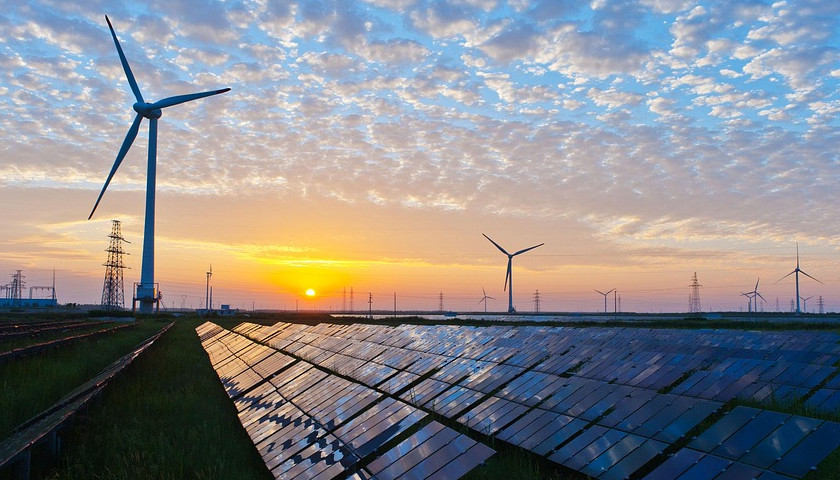by Thomas Catenacci
The Biden administration has pushed green energy in the wake of the Ukraine crisis — saying it would ensure U.S. energy independence — but has failed to address foreign mining and refining dominance, the key to renewable energy security, according to industry leaders.
The administration has argued that renewable energy technologies, like solar, wind and electric vehicles, aren’t dependent on fossil fuels and would lead to lower costs for consumers over the long term, a line of argument that Democratic lawmakers have also parroted in recent days. On Wednesday, the average price of gasoline nationwide reached $4.25 per gallon as of March 9, the highest level in history and more than 52% higher than a year ago, according to AAA data.
Russia’s invasion of Ukraine has destabilized global crude oil and natural gas markets, which Russia has established itself as a major player in over the last decade. President Joe Biden announced a ban on Russian oil imports amid the crisis, sending prices higher.
 “The only viable path to energy independence for the American economy is to reduce the energy intensity of our economy overall and ultimately to reduce it to zero and to get ourselves to a position where we are no longer reliant on fossil fuels,” National Economic Council Director Brian Deese told Bloomberg on Tuesday.
“The only viable path to energy independence for the American economy is to reduce the energy intensity of our economy overall and ultimately to reduce it to zero and to get ourselves to a position where we are no longer reliant on fossil fuels,” National Economic Council Director Brian Deese told Bloomberg on Tuesday.
“That’s a long term project, but what we are seeing today — and the geopolitics and the economic pain — should only reinforce our efforts to try to move there more quickly,” he added.
When asked about energy independence on Monday, White House press secretary Jen Psaki similarly said transitioning away from fossil fuels would alleviate high energy costs faster than building the canceled Keystone XL pipeline.
Democratic Sen. Sheldon White House tweeted Wednesday that switching to renewables would lower costs and “insulate consumers from price spikes.” California Rep. Ro Khanna, the top Democrat on the Oversight Subcommittee on Environment, added that the U.S. must have a “moonshot to invest in renewable energy” if it wants to lower gasoline prices long-term.
However, a so-called green transition would shift dependency from fossil fuel resources like oil, natural gas and coal which are abundant in the U.S., to critical minerals like cobalt, copper, lithium, nickel, graphite and zinc which are largely mined and refined by China, Russia and other foreign powers. Such minerals are essential for the production of electric vehicle batteries, battery storage facilities, solar panels and wind turbines, according to a 2021 International Energy Agency (IEA) report.
“The data shows a looming mismatch between the world’s strengthened climate ambitions and the availability of critical minerals that are essential to realizing those ambitions,” IEA Executive Director Fatih Birol said after the report was released.
The average electric car needs six times more mineral resources than a conventional car while a single onshore wind turbine plant requires nine times more minerals than a typical fossil fuel plant, the IEA report showed. A single offshore wind farm needs a whopping 8,000 kilograms of copper to produce one megawatt, enough to power just 400-900 homes.
‘Green New Deal World’
But China controlled about 55% of the world’s mining capacity and 85% of global mineral refining in 2020, a White House supply chain report from June concluded. The report pointed to Russia as another key global producer of minerals.
Experts have warned that shifting rapidly to renewables could therefore decrease energy security, forcing reliance on countries that have access to the highly sought-after minerals. Biden has committed to aggressive climate goals such as achieving a completely carbon-free grid by 2035 and net-zero emissions by 2050.
“The focus on renewables, in essence, is a license to trade what dependency we may have had on the Middle East with an almost exclusive dependency on Communist China for the materials and the processing,” Institute for Energy Research President Tom Pyle told the Daily Caller News Foundation in an interview.
“About 20% of our oil is imported directly from the Middle East,” he continued. “Today, without any changes to the landscape, we’d be about 80% dependent on China, in a ‘Green New Deal world.’”
Pyle compared the critical mineral trade to the direct Russia-to-Germany natural gas Nord Stream 2 pipeline. Critics, including U.S. lawmakers, slammed the pipeline for its potential to tether European energy supply to Russian state-run energy firms.
The German government halted its review of the pipeline amid the Russian invasion of Ukraine in February.
In 2021, the U.S. mined about 6% of the global copper supply, 0.4% of global cobalt supplies, 0.67% of the world’s nickel, 0% of global graphite supply and about 5.7% of the world’s zinc, the annual U.S. Geological Survey analysis published in January showed.
‘Terribly Far Behind’
On Feb. 22, the Biden administration announced an all-of-government approach to boosting domestic critical mineral supplies. A White House fact sheet said critical mineral demand is projected to increase 400-600% in the coming decades while demand for minerals important for electric vehicles specifically would increase by up to 4,000%.
The president’s plan included a series of funding agreements with the private sector on future domestic mining and refining projects. As part of the initiative, the Departments of Defense, State and Energy also unveiled a plan to stockpile minerals for future use.
Miners, however, slammed the administration’s plan, saying it would mean greater reliance on foreign materials since it would begin immediately stockpiling minerals not yet mined in the U.S., Reuters reported. The National Mining Association (NMA) applauded the effort but suggested Biden should push harder for domestic production.
“The challenge is: Is that going to transfer to enabling policies from the permitting authorities here in the United States to actually stand up and incentivize new mining, new mines, new mine production, mine expansions, for materials that are essential,” NMA President and CEO Rich Nolan told the DCNF.
“It’s more secure, coming from inside our borders than it is from overseas, especially when a lot of the suppliers now, who are trying to corner the market, include hostile regimes such as China and Russia,” he added.
Nolan noted the U.S. environmental review process for approving new mining projects is cumbersome and can cause American mines to fall behind their foreign rivals. It takes an estimated 10 years for the federal government to approve a mining permit in the U.S., one of the longest approval processes in the world, according to the NMA.
“The US is terribly far behind,” he said. “When you look at even our allies in Canada and Australia, it can take two to three years. That’s a huge problem.”
He added that, in its report, the White House completely neglected to address how the Department of Interior (DOI), which oversees permitting for mine projects, would improve the regulatory process. Instead, the DOI opened the door for further regulations and legal hurdles, Nolan said.
Environmentalists have opposed mining projects around the world, arguing they are detrimental to the surrounding ecosystem and environment.
In January, the DOI nixed the permits for the Twin Metals Minnesota project approved during the Trump administration, explaining that it hadn’t undergone a complete environmental review. The project would have produced copper, nickel, cobalt and platinum and created union jobs.
“It was purely a political decision,” Minnesota Rep. Pete Stauber, the top Republican on the Natural Resources Energy and Mineral Subcommittee, told the DCNF in an interview. “We need to secure our critical minerals, we need energy and mining dominance in this nation.”
An estimated 95% of U.S. nickel reserves, 88% of U.S. cobalt reserves and more than 30% of U.S. copper reserves are located at the now-cancelled Twin Metals site, according to Stauber.
“If foreign adversarial nations stopped selling us critical minerals, it would be devastating for our nation, it would be devastating for the Department of Defense, it would be devastating for the medical instrument company, it would be devastating for our everyday lives,” Stauber said, noting the other areas of the economy dependent on minerals.
“So we have the opportunity to mine these minerals in the United States of America, and this administration is hell bent on banning mining across this nation,” he continued.
– – –
Thomas Catenacci is a reporter at Daily Caller News Foundation.




